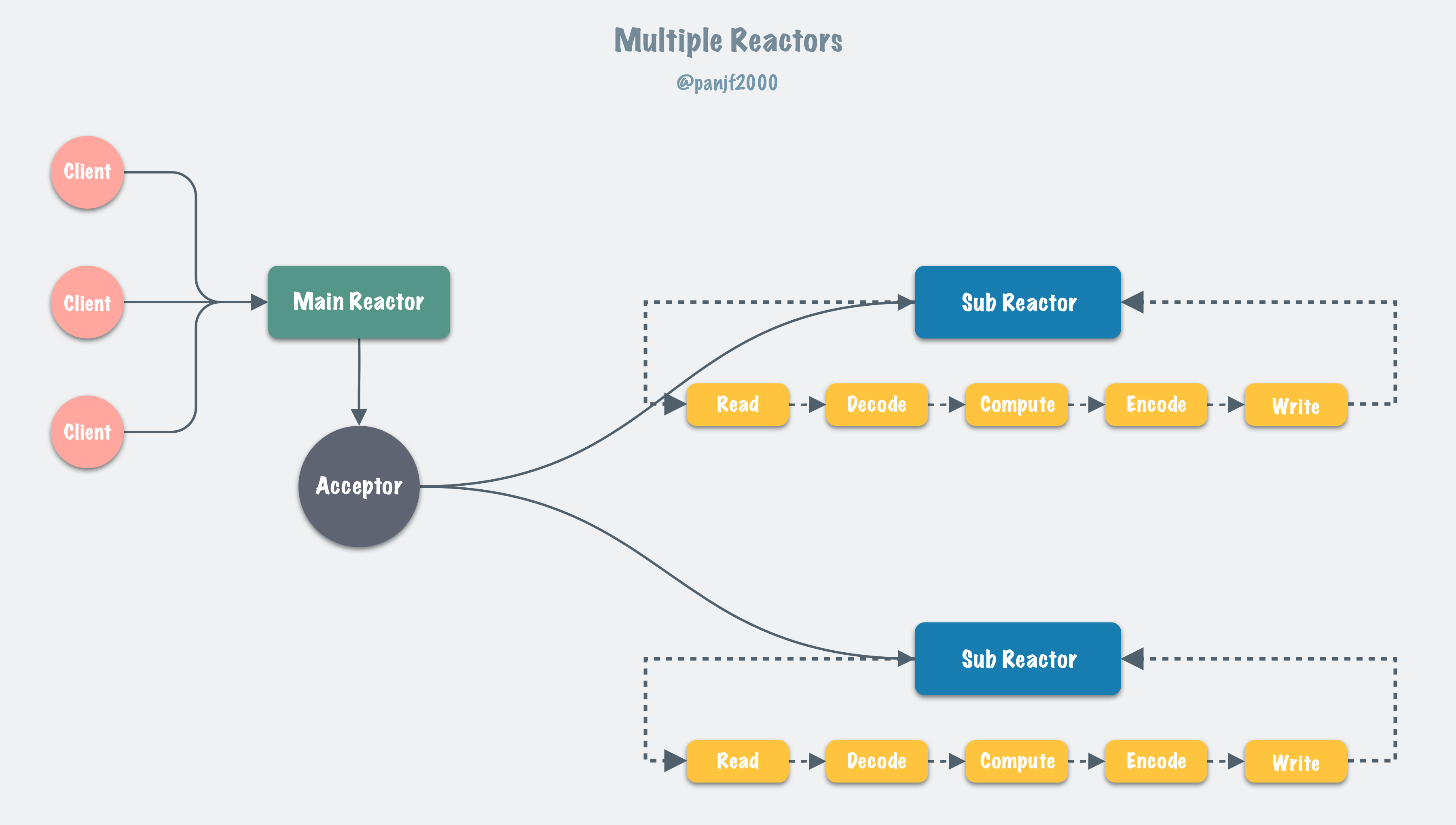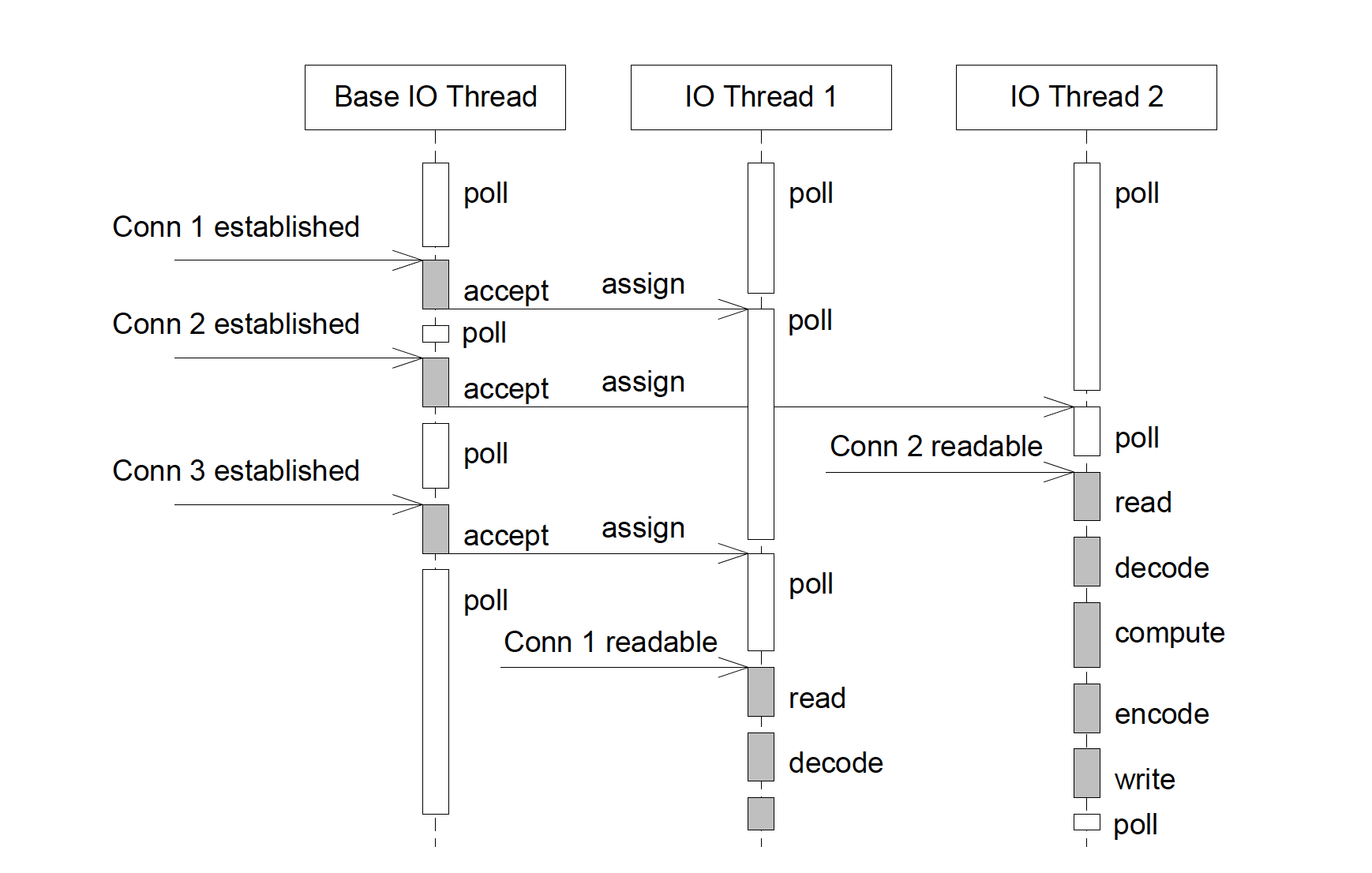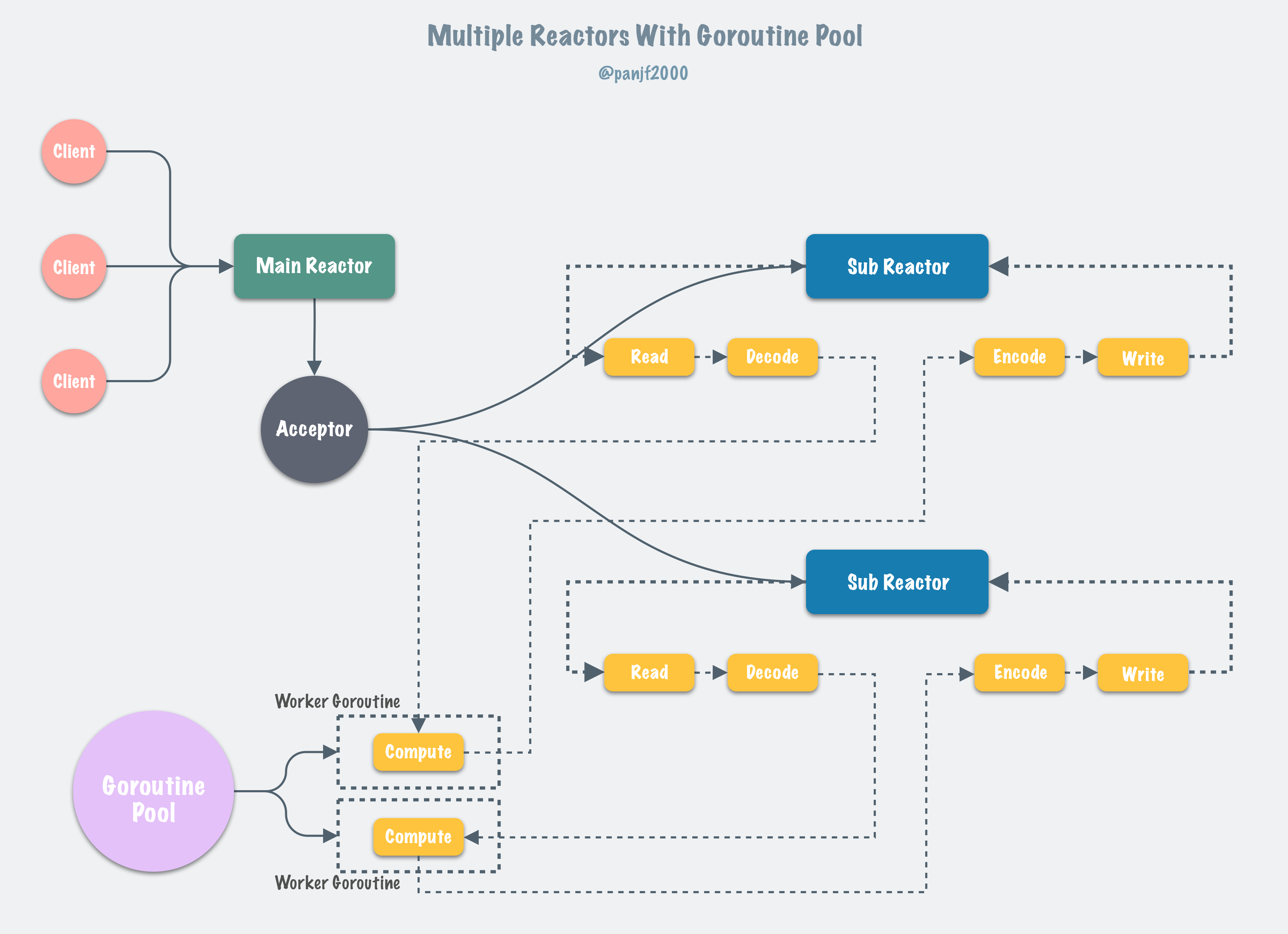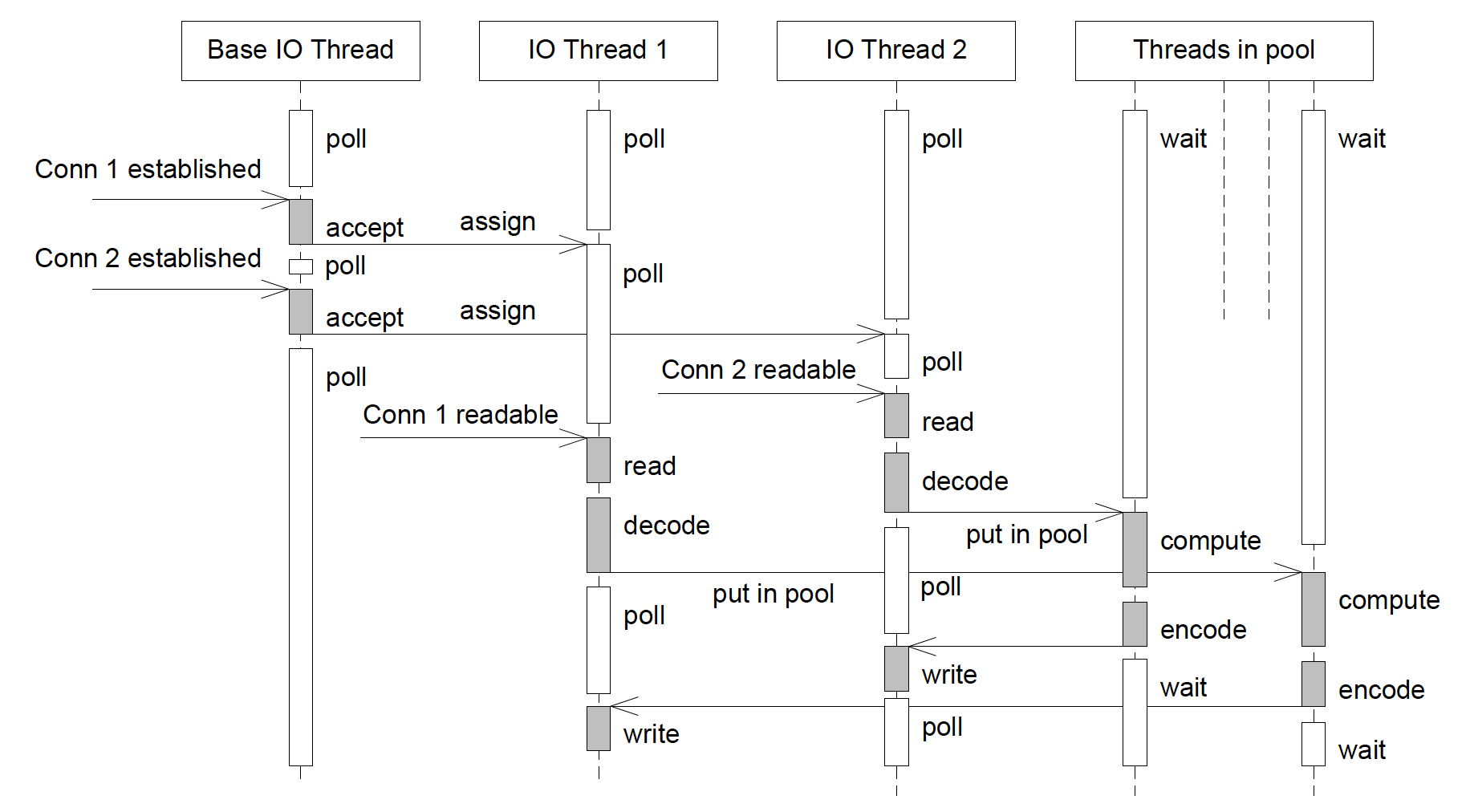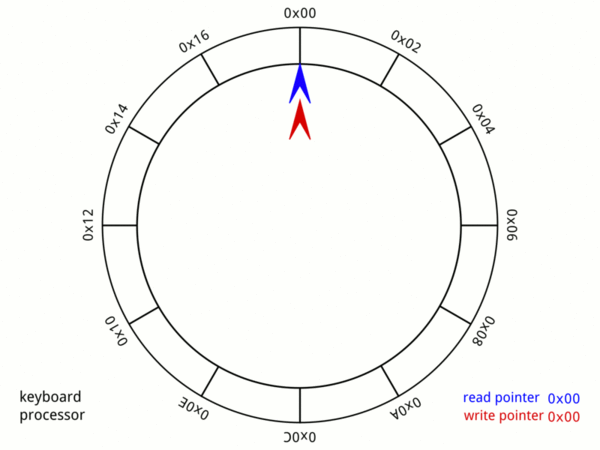English | 🇨🇳中文
gnet is an event-driven networking framework that is fast and lightweight. It makes direct epoll and kqueue syscalls rather than using the standard Go net package, and works in a similar manner as netty and libuv.
gnet is not designed to displace the standard Go net package, but to create a networking server framework for Go that performs on par with Redis and Haproxy for networking packets handling.
gnet sells itself as a high-performance, lightweight, non-blocking, event-driven networking framework written in pure Go which works on transport layer with TCP/UDP protocols and Unix Domain Socket , so it allows developers to implement their own protocols(HTTP, RPC, WebSocket, Redis, etc.) of application layer upon gnet for building diversified network applications, for instance, you get an HTTP Server or Web Framework if you implement HTTP protocol upon gnet while you have a Redis Server done with the implementation of Redis protocol upon gnet and so on.
gnet derives from the project: evio while having a much higher performance and more features.
- High-performance event-loop under networking model of multiple threads/goroutines
- Built-in goroutine pool powered by the library ants
- Built-in memory pool with bytes powered by the library bytebufferpool
- Concise APIs
- Efficient memory usage: Ring-Buffer
- Supporting multiple protocols/IPC mechanism:
TCP,UDPandUnix Domain Socket - Supporting multiple load-balancing algorithms:
Round-Robin,Source Addr HashandLeast-Connections - Supporting two event-driven mechanisms:
epollon Linux andkqueueon FreeBSD - Supporting asynchronous write operation
- Flexible ticker event
- SO_REUSEPORT socket option
- Built-in multiple codecs to encode/decode network frames into/from TCP stream: LineBasedFrameCodec, DelimiterBasedFrameCodec, FixedLengthFrameCodec and LengthFieldBasedFrameCodec, referencing netty codec, also supporting customized codecs
- Supporting Windows platform with
event-driven mechanism of IOCPGo stdlib: net - Implementation of
gnetClient
gnet redesigns and implements a new built-in networking model of multiple threads/goroutines: 『multiple reactors』 which is also the default networking model of multiple threads in netty, Here's the schematic diagram:
and it works as the following sequence diagram:
You may ask me a question: what if my business logic in EventHandler.React contains some blocking code which leads to blocking in event-loop of gnet, what is the solution for this kind of situation?
As you know, there is a most important tenet when writing code under gnet: you should never block the event-loop goroutine in the EventHandler.React, which is also the most important tenet in netty, otherwise, it will result in a low throughput in your gnet server.
And the solution to that could be found in the subsequent networking model of multiple threads/goroutines in gnet: 『multiple reactors with thread/goroutine pool』which pulls you out from the blocking mire, it will construct a worker-pool with fixed capacity and put those blocking jobs in EventHandler.React into the worker-pool to make the event-loop goroutines non-blocking.
The networking model:『multiple reactors with thread/goroutine pool』dissolves the blocking jobs by introducing a goroutine pool, as shown below:
and it works as the following sequence diagram:
gnet implements the networking model:『multiple reactors with thread/goroutine pool』by the aid of a high-performance goroutine pool called ants that allows you to manage and recycle a massive number of goroutines in your concurrent programs, the full features and usages in ants are documented here.
gnet integrates ants and provides the pool.goroutine.Default() method that you can call to instantiate a ants pool where you are able to put your blocking code logic and call the function gnet.Conn.AsyncWrite([]byte) to send out data asynchronously after you finish the blocking process and get the output data, which makes the goroutine of event-loop non-blocking.
The details about integrating gnet with ants are shown here.
There are two ring-buffers inside gnet: inbound buffer and outbound buffer to buffer and manage inbound/outbound network data.
The purpose of implementing inbound and outbound ring-buffers in gnet is to transfer the logic of buffering and managing network data based on application protocol upon TCP stream from business server to framework and unify the network data buffer, which minimizes the complexity of business code so that developers are able to concentrate on business logic instead of the underlying implementation.
gnet requires Go 1.9 or later.
go get -u github.com/panjf2000/gnetgnet is available as a Go module, with Go 1.11 Modules support (Go 1.11+), just simply import "github.com/panjf2000/gnet" in your source code and go [build|run|test] will download the necessary dependencies automatically.
The detailed documentation is located in here: docs of gnet, but let's pass through the brief instructions first.
It is easy to create a network server with gnet. All you have to do is just to make your implementation of gnet.EventHandler interface and register your event-handler functions to it, then pass it to the gnet.Serve function along with the binding address(es). Each connection is represented as a gnet.Conn interface that is passed to various events to differentiate the clients. At any point you can close a connection or shutdown the server by return a Close or Shutdown action from an event function.
The simplest example to get you started playing with gnet would be the echo server. So here you are, a simplest echo server upon gnet that is listening on port 9000:
Old version(<=v1.0.0-rc.4)
package main
import (
"log"
"github.com/panjf2000/gnet"
)
type echoServer struct {
*gnet.EventServer
}
func (es *echoServer) React(c gnet.Conn) (out []byte, action gnet.Action) {
out = c.Read()
c.ResetBuffer()
return
}
func main() {
echo := new(echoServer)
log.Fatal(gnet.Serve(echo, "tcp://:9000", gnet.WithMulticore(true)))
}package main
import (
"log"
"github.com/panjf2000/gnet"
)
type echoServer struct {
*gnet.EventServer
}
func (es *echoServer) React(frame []byte, c gnet.Conn) (out []byte, action gnet.Action) {
out = frame
return
}
func main() {
echo := new(echoServer)
log.Fatal(gnet.Serve(echo, "tcp://:9000", gnet.WithMulticore(true)))
}As you can see, this example of echo server only sets up the EventHandler.React function where you commonly write your main business code and it will be called once the server receives input data from a client. What you should know is that the input parameter: frame is a complete packet which has been decoded by the codec, as a general rule, you should implement the gnet codec interface as the business codec to packet and unpacket TCP stream, but if you don't, your gnet server is going to work with the default codec under the acquiescence, which means all data inculding latest data and previous data in buffer will be stored in the input parameter: frame when EventHandler.React is being triggered. The output data will be then encoded and sent back to that client by assigning the out variable and returning it after your business code finish processing data(in this case, it just echo the data back).
Old version(<=v1.0.0-rc.4)
package main
import (
"log"
"time"
"github.com/panjf2000/gnet"
"github.com/panjf2000/gnet/pool/goroutine"
)
type echoServer struct {
*gnet.EventServer
pool *goroutine.Pool
}
func (es *echoServer) React(c gnet.Conn) (out []byte, action gnet.Action) {
data := append([]byte{}, c.Read()...)
c.ResetBuffer()
// Use ants pool to unblock the event-loop.
_ = es.pool.Submit(func() {
time.Sleep(1 * time.Second)
c.AsyncWrite(data)
})
return
}
func main() {
p := goroutine.Default()
defer p.Release()
echo := &echoServer{pool: p}
log.Fatal(gnet.Serve(echo, "tcp://:9000", gnet.WithMulticore(true)))
}package main
import (
"log"
"time"
"github.com/panjf2000/gnet"
"github.com/panjf2000/gnet/pool/goroutine"
)
type echoServer struct {
*gnet.EventServer
pool *goroutine.Pool
}
func (es *echoServer) React(frame []byte, c gnet.Conn) (out []byte, action gnet.Action) {
data := append([]byte{}, frame...)
// Use ants pool to unblock the event-loop.
_ = es.pool.Submit(func() {
time.Sleep(1 * time.Second)
c.AsyncWrite(data)
})
return
}
func main() {
p := goroutine.Default()
defer p.Release()
echo := &echoServer{pool: p}
log.Fatal(gnet.Serve(echo, "tcp://:9000", gnet.WithMulticore(true)))
}Like I said in the 『Multiple Reactors + Goroutine-Pool』section, if there are blocking code in your business logic, then you ought to turn them into non-blocking code in any way, for instance you can wrap them into a goroutine, but it will result in a massive amount of goroutines if massive traffic is passing through your server so I would suggest you utilize a goroutine pool like ants to manage those goroutines and reduce the cost of system resources.
All gnet examples:
TCP Echo Server
package main
import (
"flag"
"fmt"
"log"
"github.com/panjf2000/gnet"
)
type echoServer struct {
*gnet.EventServer
}
func (es *echoServer) OnInitComplete(srv gnet.Server) (action gnet.Action) {
log.Printf("Echo server is listening on %s (multi-cores: %t, loops: %d)\n",
srv.Addr.String(), srv.Multicore, srv.NumEventLoop)
return
}
func (es *echoServer) React(frame []byte, c gnet.Conn) (out []byte, action gnet.Action) {
// Echo synchronously.
out = frame
return
/*
// Echo asynchronously.
data := append([]byte{}, frame...)
go func() {
time.Sleep(time.Second)
c.AsyncWrite(data)
}()
return
*/
}
func main() {
var port int
var multicore bool
// Example command: go run echo.go --port 9000 --multicore=true
flag.IntVar(&port, "port", 9000, "--port 9000")
flag.BoolVar(&multicore, "multicore", false, "--multicore true")
flag.Parse()
echo := new(echoServer)
log.Fatal(gnet.Serve(echo, fmt.Sprintf("tcp://:%d", port), gnet.WithMulticore(multicore)))
}UDP Echo Server
package main
import (
"flag"
"fmt"
"log"
"github.com/panjf2000/gnet"
)
type echoServer struct {
*gnet.EventServer
}
func (es *echoServer) OnInitComplete(srv gnet.Server) (action gnet.Action) {
log.Printf("UDP Echo server is listening on %s (multi-cores: %t, loops: %d)\n",
srv.Addr.String(), srv.Multicore, srv.NumEventLoop)
return
}
func (es *echoServer) React(frame []byte, c gnet.Conn) (out []byte, action gnet.Action) {
// Echo synchronously.
out = frame
return
/*
// Echo asynchronously.
data := append([]byte{}, frame...)
go func() {
time.Sleep(time.Second)
c.SendTo(data)
}()
return
*/
}
func main() {
var port int
var multicore, reuseport bool
// Example command: go run echo.go --port 9000 --multicore=true --reuseport=true
flag.IntVar(&port, "port", 9000, "--port 9000")
flag.BoolVar(&multicore, "multicore", false, "--multicore true")
flag.BoolVar(&reuseport, "reuseport", false, "--reuseport true")
flag.Parse()
echo := new(echoServer)
log.Fatal(gnet.Serve(echo, fmt.Sprintf("udp://:%d", port), gnet.WithMulticore(multicore), gnet.WithReusePort(reuseport)))
}UDS Echo Server
package main
import (
"flag"
"fmt"
"log"
"github.com/panjf2000/gnet"
)
type echoServer struct {
*gnet.EventServer
}
func (es *echoServer) OnInitComplete(srv gnet.Server) (action gnet.Action) {
log.Printf("Echo server is listening on %s (multi-cores: %t, loops: %d)\n",
srv.Addr.String(), srv.Multicore, srv.NumEventLoop)
return
}
func (es *echoServer) React(frame []byte, c gnet.Conn) (out []byte, action gnet.Action) {
// Echo synchronously.
out = frame
return
/*
// Echo asynchronously.
data := append([]byte{}, frame...)
go func() {
time.Sleep(time.Second)
c.AsyncWrite(data)
}()
return
*/
}
func main() {
var addr string
var multicore bool
// Example command: go run echo.go --sock echo.sock --multicore=true
flag.StringVar(&addr, "sock", "echo.sock", "--port 9000")
flag.BoolVar(&multicore, "multicore", false, "--multicore true")
flag.Parse()
echo := new(echoServer)
log.Fatal(gnet.Serve(echo, fmt.Sprintf("unix://%s", addr), gnet.WithMulticore(multicore)))
}HTTP Server
package main
import (
"flag"
"fmt"
"log"
"strconv"
"strings"
"time"
"unsafe"
"github.com/panjf2000/gnet"
)
var res string
type request struct {
proto, method string
path, query string
head, body string
remoteAddr string
}
type httpServer struct {
*gnet.EventServer
}
var errMsg = "Internal Server Error"
var errMsgBytes = []byte(errMsg)
type httpCodec struct {
req request
}
func (hc *httpCodec) Encode(c gnet.Conn, buf []byte) (out []byte, err error) {
if c.Context() == nil {
return buf, nil
}
return appendResp(out, "500 Error", "", errMsg+"\n"), nil
}
func (hc *httpCodec) Decode(c gnet.Conn) (out []byte, err error) {
buf := c.Read()
c.ResetBuffer()
// process the pipeline
var leftover []byte
pipeline:
leftover, err = parseReq(buf, &hc.req)
// bad thing happened
if err != nil {
c.SetContext(err)
return nil, err
} else if len(leftover) == len(buf) {
// request not ready, yet
return
}
out = appendHandle(out, res)
buf = leftover
goto pipeline
}
func (hs *httpServer) OnInitComplete(srv gnet.Server) (action gnet.Action) {
log.Printf("HTTP server is listening on %s (multi-cores: %t, loops: %d)\n",
srv.Addr.String(), srv.Multicore, srv.NumEventLoop)
return
}
func (hs *httpServer) React(frame []byte, c gnet.Conn) (out []byte, action gnet.Action) {
if c.Context() != nil {
// bad thing happened
out = errMsgBytes
action = gnet.Close
return
}
// handle the request
out = frame
return
}
func main() {
var port int
var multicore bool
// Example command: go run http.go --port 8080 --multicore=true
flag.IntVar(&port, "port", 8080, "server port")
flag.BoolVar(&multicore, "multicore", true, "multicore")
flag.Parse()
res = "Hello World!\r\n"
http := new(httpServer)
hc := new(httpCodec)
// Start serving!
log.Fatal(gnet.Serve(http, fmt.Sprintf("tcp://:%d", port), gnet.WithMulticore(multicore), gnet.WithCodec(hc)))
}
// appendHandle handles the incoming request and appends the response to
// the provided bytes, which is then returned to the caller.
func appendHandle(b []byte, res string) []byte {
return appendResp(b, "200 OK", "", res)
}
// appendResp will append a valid http response to the provide bytes.
// The status param should be the code plus text such as "200 OK".
// The head parameter should be a series of lines ending with "\r\n" or empty.
func appendResp(b []byte, status, head, body string) []byte {
b = append(b, "HTTP/1.1"...)
b = append(b, ' ')
b = append(b, status...)
b = append(b, '\r', '\n')
b = append(b, "Server: gnet\r\n"...)
b = append(b, "Date: "...)
b = time.Now().AppendFormat(b, "Mon, 02 Jan 2006 15:04:05 GMT")
b = append(b, '\r', '\n')
if len(body) > 0 {
b = append(b, "Content-Length: "...)
b = strconv.AppendInt(b, int64(len(body)), 10)
b = append(b, '\r', '\n')
}
b = append(b, head...)
b = append(b, '\r', '\n')
if len(body) > 0 {
b = append(b, body...)
}
return b
}
func b2s(b []byte) string {
return *(*string)(unsafe.Pointer(&b))
}
// parseReq is a very simple http request parser. This operation
// waits for the entire payload to be buffered before returning a
// valid request.
func parseReq(data []byte, req *request) (leftover []byte, err error) {
sdata := b2s(data)
var i, s int
var head string
var clen int
var q = -1
// method, path, proto line
for ; i < len(sdata); i++ {
if sdata[i] == ' ' {
req.method = sdata[s:i]
for i, s = i+1, i+1; i < len(sdata); i++ {
if sdata[i] == '?' && q == -1 {
q = i - s
} else if sdata[i] == ' ' {
if q != -1 {
req.path = sdata[s:q]
req.query = req.path[q+1 : i]
} else {
req.path = sdata[s:i]
}
for i, s = i+1, i+1; i < len(sdata); i++ {
if sdata[i] == '\n' && sdata[i-1] == '\r' {
req.proto = sdata[s:i]
i, s = i+1, i+1
break
}
}
break
}
}
break
}
}
if req.proto == "" {
return data, fmt.Errorf("malformed request")
}
head = sdata[:s]
for ; i < len(sdata); i++ {
if i > 1 && sdata[i] == '\n' && sdata[i-1] == '\r' {
line := sdata[s : i-1]
s = i + 1
if line == "" {
req.head = sdata[len(head)+2 : i+1]
i++
if clen > 0 {
if len(sdata[i:]) < clen {
break
}
req.body = sdata[i : i+clen]
i += clen
}
return data[i:], nil
}
if strings.HasPrefix(line, "Content-Length:") {
n, err := strconv.ParseInt(strings.TrimSpace(line[len("Content-Length:"):]), 10, 64)
if err == nil {
clen = int(n)
}
}
}
}
// not enough data
return data, nil
}Push Server
package main
import (
"flag"
"fmt"
"log"
"sync"
"time"
"github.com/panjf2000/gnet"
)
type pushServer struct {
*gnet.EventServer
tick time.Duration
connectedSockets sync.Map
}
func (ps *pushServer) OnInitComplete(srv gnet.Server) (action gnet.Action) {
log.Printf("Push server is listening on %s (multi-cores: %t, loops: %d), "+
"pushing data every %s ...\n", srv.Addr.String(), srv.Multicore, srv.NumEventLoop, ps.tick.String())
return
}
func (ps *pushServer) OnOpened(c gnet.Conn) (out []byte, action gnet.Action) {
log.Printf("Socket with addr: %s has been opened...\n", c.RemoteAddr().String())
ps.connectedSockets.Store(c.RemoteAddr().String(), c)
return
}
func (ps *pushServer) OnClosed(c gnet.Conn, err error) (action gnet.Action) {
log.Printf("Socket with addr: %s is closing...\n", c.RemoteAddr().String())
ps.connectedSockets.Delete(c.RemoteAddr().String())
return
}
func (ps *pushServer) Tick() (delay time.Duration, action gnet.Action) {
log.Println("It's time to push data to clients!!!")
ps.connectedSockets.Range(func(key, value interface{}) bool {
addr := key.(string)
c := value.(gnet.Conn)
c.AsyncWrite([]byte(fmt.Sprintf("heart beating to %s\n", addr)))
return true
})
delay = ps.tick
return
}
func (ps *pushServer) React(frame []byte, c gnet.Conn) (out []byte, action gnet.Action) {
out = frame
return
}
func main() {
var port int
var multicore bool
var interval time.Duration
var ticker bool
// Example command: go run push.go --port 9000 --tick 1s --multicore=true
flag.IntVar(&port, "port", 9000, "server port")
flag.BoolVar(&multicore, "multicore", true, "multicore")
flag.DurationVar(&interval, "tick", 0, "pushing tick")
flag.Parse()
if interval > 0 {
ticker = true
}
push := &pushServer{tick: interval}
log.Fatal(gnet.Serve(push, fmt.Sprintf("tcp://:%d", port), gnet.WithMulticore(multicore), gnet.WithTicker(ticker)))
}Codec Client/Server
Client:
// Reference https://github.com/smallnest/goframe/blob/master/_examples/goclient/client.go
package main
import (
"encoding/binary"
"fmt"
"net"
"github.com/smallnest/goframe"
)
func main() {
conn, err := net.Dial("tcp", "127.0.0.1:9000")
if err != nil {
panic(err)
}
defer conn.Close()
encoderConfig := goframe.EncoderConfig{
ByteOrder: binary.BigEndian,
LengthFieldLength: 4,
LengthAdjustment: 0,
LengthIncludesLengthFieldLength: false,
}
decoderConfig := goframe.DecoderConfig{
ByteOrder: binary.BigEndian,
LengthFieldOffset: 0,
LengthFieldLength: 4,
LengthAdjustment: 0,
InitialBytesToStrip: 4,
}
fc := goframe.NewLengthFieldBasedFrameConn(encoderConfig, decoderConfig, conn)
err = fc.WriteFrame([]byte("hello"))
if err != nil {
panic(err)
}
err = fc.WriteFrame([]byte("world"))
if err != nil {
panic(err)
}
buf, err := fc.ReadFrame()
if err != nil {
panic(err)
}
fmt.Println("received: ", string(buf))
buf, err = fc.ReadFrame()
if err != nil {
panic(err)
}
fmt.Println("received: ", string(buf))
}Server:
package main
import (
"encoding/binary"
"flag"
"fmt"
"log"
"time"
"github.com/panjf2000/gnet"
"github.com/panjf2000/gnet/pool/goroutine"
)
type codecServer struct {
*gnet.EventServer
addr string
multicore bool
async bool
codec gnet.ICodec
workerPool *goroutine.Pool
}
func (cs *codecServer) OnInitComplete(srv gnet.Server) (action gnet.Action) {
log.Printf("Test codec server is listening on %s (multi-cores: %t, loops: %d)\n",
srv.Addr.String(), srv.Multicore, srv.NumEventLoop)
return
}
func (cs *codecServer) React(frame []byte, c gnet.Conn) (out []byte, action gnet.Action) {
if cs.async {
data := append([]byte{}, frame...)
_ = cs.workerPool.Submit(func() {
c.AsyncWrite(data)
})
return
}
out = frame
return
}
func testCodecServe(addr string, multicore, async bool, codec gnet.ICodec) {
var err error
if codec == nil {
encoderConfig := gnet.EncoderConfig{
ByteOrder: binary.BigEndian,
LengthFieldLength: 4,
LengthAdjustment: 0,
LengthIncludesLengthFieldLength: false,
}
decoderConfig := gnet.DecoderConfig{
ByteOrder: binary.BigEndian,
LengthFieldOffset: 0,
LengthFieldLength: 4,
LengthAdjustment: 0,
InitialBytesToStrip: 4,
}
codec = gnet.NewLengthFieldBasedFrameCodec(encoderConfig, decoderConfig)
}
cs := &codecServer{addr: addr, multicore: multicore, async: async, codec: codec, workerPool: goroutine.Default()}
err = gnet.Serve(cs, addr, gnet.WithMulticore(multicore), gnet.WithTCPKeepAlive(time.Minute*5), gnet.WithCodec(codec))
if err != nil {
panic(err)
}
}
func main() {
var port int
var multicore bool
// Example command: go run server.go --port 9000 --multicore=true
flag.IntVar(&port, "port", 9000, "server port")
flag.BoolVar(&multicore, "multicore", true, "multicore")
flag.Parse()
addr := fmt.Sprintf("tcp://:%d", port)
testCodecServe(addr, multicore, false, nil)
}For more details, check out here: examples of gnet.
Current supported I/O events in gnet:
EventHandler.OnInitCompletefires when the server has been initialized and ready to accept new connections.EventHandler.OnOpenedfires once a connection has been opened.EventHandler.OnClosedfires after a connection has been closed.EventHandler.Reactfires when the server receives inbound data from a socket/connection. (usually it is where you write the code of business logic)EventHandler.Tickfires right after the server starts and then fires every specified interval.EventHandler.PreWritefires just before any data has been written to client.
The EventHandler.Tick event fires ticks at a specified interval.
The first tick fires right after the gnet server starts up and if you intend to set up a ticker event, don't forget to pass an option: gnet.WithTicker(true) to gnet.Serve.
events.Tick = func() (delay time.Duration, action Action){
log.Printf("tick")
delay = time.Second
return
}gnet supports UDP protocol so the gnet.Serve method can bind to UDP addresses.
- All incoming and outgoing packets will not be buffered but read and sent directly.
- The
EventHandler.OnOpenedandEventHandler.OnClosedevents are not available for UDP sockets, only theReactevent. - The UDP equivalents of
AsyncWrite([]byte)in TCP isSendTo([]byte).
gnet also supports UDS(Unix Domain Socket), just pass the UDS addresses like "unix://xxx" to the gnet.Serve method and you could play with it.
It is nothing different from making use of TCP when doing stuff with UDS, so the gnet UDS servers are able to leverage all event functions which are available under TCP protocol.
The gnet.WithMulticore(true) indicates whether the server will be effectively created with multi-cores, if so, then you must take care of synchronizing memory between all event callbacks, otherwise, it will run the server with a single thread. The number of threads in the server will be automatically assigned to the value of runtime.NumCPU().
gnet currently supports three load balancing algorithms: Round-Robin, Source Addr Hash and Least-Connections, you are able to decide which algorithm to use by passing the functional option LB (RoundRobin/LeastConnections/SourceAddrHash) to gnet.Serve.
If the load balancing algorithm is not specified explicitly, gnet will use Round-Robin by default.
gnet server is able to utilize the SO_REUSEPORT option which allows multiple sockets on the same host to bind to the same port and the OS kernel takes care of the load balancing for you, it wakes one socket per connect event coming to resolved the thundering herd.
By default, gnet is not going to be haunted by the thundering herd under its networking model:『multiple reactors』which gets only one main reactor to listen on "address:port" and accept new sockets. So this SO_REUSEPORT option is trivial in gnet but note that it will fall back to the old networking model of evio when you enable the SO_REUSEPORT option.
Just use functional options to set up SO_REUSEPORT and you can enjoy this feature:
gnet.Serve(events, "tcp://:9000", gnet.WithMulticore(true), gnet.WithReusePort(true)))There are multiple built-in codecs in gnet which allow you to encode/decode frames into/from TCP stream.
So far gnet has four kinds of built-in codecs: LineBasedFrameCodec, DelimiterBasedFrameCodec, FixedLengthFrameCodec and LengthFieldBasedFrameCodec, which generally meets most scenarios, but still gnet allows users to customize their own codecs in their gnet servers by implementing the interface gnet.ICodec and replacing the default codec in gnet with customized codec via functional options.
Here is an example with codec, showing you how to leverage codec to encode/decode network frames into/from TCP stream.
# Hardware
CPU: 28 HT Cores Intel(R) Xeon(R) Gold 5120 CPU @ 2.20GHz
Mem: 32GB RAM
OS : Ubuntu 18.04.3 4.15.0-88-generic #88-Ubuntu
Net: Switched 10-gigabit ethernet
Go : go1.14.x linux/amd64This is the top 50 on the framework ranking of all programming languages consists of a total of 382 frameworks from all over the world.
This is the full framework ranking of Golang.
To see the full ranking list, visit Full ranking list of Plaintext.
# Machine information
OS : Ubuntu 18.04/x86_64
CPU : 8 Virtual CPUs
Memory : 16.0 GiB
# Go version and configurations
Go Version : go1.12.9 linux/amd64
GOMAXPROCS=8# Machine information
OS : macOS Mojave 10.14.6/x86_64
CPU : 4 CPUs
Memory : 8.0 GiB
# Go version and configurations
Go Version : go version go1.12.9 darwin/amd64
GOMAXPROCS=4Source code in gnet is available under the MIT License.
Please read our Contributing Guidelines before opening a PR and thank you to all the developers who already made contributions to gnet!
- A Million WebSockets and Go
- Going Infinite, handling 1M websockets connections in Go
- Go netpoll I/O 多路复用构建原生网络模型之源码深度解析
- gnet: 一个轻量级且高性能的 Golang 网络库
- 最快的 Go 网络框架 gnet 来啦!
gnet had been being developed with GoLand IDE under the free JetBrains Open Source license(s) granted by JetBrains s.r.o., hence I would like to express my thanks here.
Support us with a monthly donation and help us continue our activities.
Become a bronze sponsor with a monthly donation of $10 and get your logo on our README on Github.







